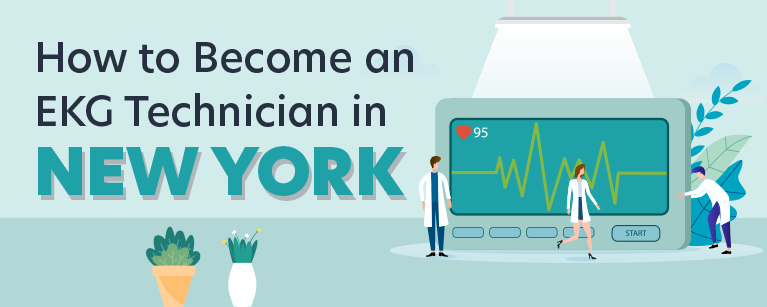
Becoming an electrocardiograph (EKG) technician in New York State is an excellent option for kickstarting your medical career with minimal educational requirements.
EKG techs maintain and operate EKG equipment to help identify heart issues and effective treatment before they become issues.
New York has countless EKG training programs, and the salaries vary depending on where you live, with the best pay in New York City due to the high cost of living.
To become an EKG tech, a process must be followed before entering the workforce.
Keep reading to learn more!
Table of Contents
Licensing Requirements to Become an EKG Technician
Graduate from High School
The minimum requirement to become an EKG in New York State is earning a GED or high school diploma.
EKG training programs won’t admit students without this achievement, and employers won’t hire you without the training program, so check this box.
If you’re currently in high school and interested in pursuing this career, focus your coursework on chemistry, biology, anatomy, communications, and healthcare classes to give you a head start on the training program.
Find a Training Program
Once you’ve completed high school, you must find and complete a New York-accredited EKG technician training program.
These are most commonly found at community colleges and vocational schools across the state.
Due to technological advancements, most programs can be completed in a hybrid format with online lectures and laboratory clinical work.
During the program, expect to take the following classes to sharpen your EKG knowledge:
- Cardiac anatomy
- Echocardiography
- EKG tracing interpretation and identification
- Electric conduction in the heart
- Electrocardiography
- Medical terminology
- Physiology
EKG certificate programs can be completed in six weeks, but most range from four to six months.
Diploma programs are slightly longer at around one year, and associate degrees require a two-year time commitment due to the addition of general education classes.
Take the EKG Technical Certification Exam
Earning an EKG technical certification in New York State gives you an advantage over job applicants who don’t hold this designation and could lead to a higher starting salary.
The National Healthcareer Association offers an examination to become a certified EKG technician.
The organization offers online practice exams and other study materials for those looking to earn this license and be a step ahead of the employment competition.
Job Search
After the exam, it’s time to search for a job.
EKG techs are needed across various healthcare locations, including hospitals, diagnostics centers, clinics, and general medicine facilities.
Since EKG tech is in demand across the entire state, jobs are plentiful, and the future outlook is high.
Advanced Education
Many EKG technicians seek advanced certifications and specializations after employment to further their skills and knowledge.
Higher education degrees and certifications can result in higher-level positions within the field or help you move to an entirely different profession within the medical industry.
EKG specializations include stress testing and Holter monitoring, which leads to a subject matter expert and potentially more money.
5 EKG Technician Schools in New York
American Society of Electrocardiogram Technicians
For those located in Western New York, ASET offers a training program that prepares students for the national certification exam.
The program provides all study materials and requires 40-80 class hours with 20-40 clinical hours.
The typical program class size is 10-30 students, and the time commitment varies since it’s a self-paced curriculum.
MedCerts
MedCerts offers an all-inclusive certification training program with on-demand coursework materials that utilize the 12 elements of eLearning.
Students can access one-on-one mentoring, exam prep, and all course materials throughout the course.
The certification exam cost is also included in tuition.
Since this is an online program, it gives students the flexibility to train around their schedule.
Medical Training Institute of New York
MTI has an EKG tech program that prepares students for entry-level EKG technician work and the certification exam.
The course comprises hands-on clinical training and online lectures for the ultimate flexibility.
Students will learn the following:
- Anatomy and physiology
- Career development
- Health and safety
- Introduction to EKG
- Medical terminology
- NHA examination preparation
National Performance Specialists (NPS)
NPS offers an EKG training program for $200 comprising all study materials and practice exams needed to pass the certification exam using a proprietary e-learning platform.
As this is a self-paced program, the time commitment varies based on your flexibility and examination preparation timing.
Tuition costs include the cost of the national exam.
| School Name | Address |
|---|---|
| American Society of Electrocardiogram Technicians | 1717 Pennsylvania Avenue Suite 1025 Washington D.C. 20006, United States |
| MedCerts | 14143 Farmington Road Livonia, MI 48154, United States |
| Medical Training Institute of New York | 211 E 43rd St, New York, NY 10017, United States |
| National Performance Specialists (NPS) | 1717 Pennsylvania Avenue NW #1025, Washington, DC 20006, United States |
Salary
The median yearly U.S. compensation for an EKG technician is $42,700, with pay ranging from $33,500 to $55,500.
New York EKG technician’s salaries vary greatly depending on the city.
In Buffalo, an EKG technician can expect to average $41,700, with pay ranging from $32,700 to $54,300.
In New York City, the pay is considerably higher at $50,200, ranging from $39,300 to $65,300.
Annual Salary Range:| Location | Avg. Annual Salary |
|---|---|
| New York | $50,300 |
| Buffalo | $41,800 |
| Rochester | $42,200 |
| Yonkers | $49,400 |
| Syracuse | $42,600 |
| Albany | $43,500 |
| New Rochelle | $48,800 |
| Mount Vernon | $49,300 |
| Schenectady | $43,400 |
| Utica | $41,700 |
Regional Salary in New York
| Region | Employed | Avg. Annual Salary | Avg. Hourly Pay | Top 10% Annual Salary | Bottom 10% Annual Salary |
|---|---|---|---|---|---|
| Albany-Schenectady-Troy, NY | 230 | $64,990 | $31.25 | $92,190 | $39,710 |
| Buffalo-Cheektowaga-Niagara Falls, NY | 170 | $78,480 | $37.73 | $99,630 | $44,300 |
| New York-Newark-Jersey City, NY-NJ-PA | 3,290 | $83,300 | $40.05 | $116,930 | $48,940 |
| Rochester, NY | 170 | $74,350 | $35.74 | $105,390 | $47,810 |
| Syracuse, NY | 130 | $86,500 | $41.59 | $102,780 | $53,820 |
| Utica-Rome, NY | 40 | $83,210 | $40 | $115,350 | $42,240 |
* Employment conditions in your area may vary.
Frequently Asked Questions
What skills do students learn in New York EKG training programs?
While each curriculum differs slightly, students will learn the basics of the EKG career and work with industry equipment during the clinical portion of the program.
Other topics include complying with HIPPA guidelines, following proper medical ethics and patient confidentiality, maintaining equipment, developing the appropriate bedside manner, and basic healthcare safety.
What are the New York State requirements for EKG tech employment?
To qualify for medical facility jobs, EKG technicians must meet the following criteria:
- Be at least 18 years of age
- Pass a drug screening and background check
- Proof of immunization records
- Negative hepatitis and tuberculosis tests
Does New York State require an official EKG technician license?
Although New York State does not require an EKG technician license, almost all employers do.
The license is obtained by completing a training program preparing graduates for the national certification examination.
EKG Technician Info by State
- Alabama
- Alaska
- Arizona
- Arkansas
- California
- Colorado
- Connecticut
- Delaware
- Florida
- Georgia
- Hawaii
- Idaho
- Illinois
- Indiana
- Iowa
- Kansas
- Kentucky
- Louisiana
- Maine
- Maryland
- Massachusetts
- Michigan
- Minnesota
- Mississippi
- Missouri
- Montana
- Nebraska
- Nevada
- New Hampshire
- New Jersey
- New Mexico
- New York
- North Carolina
- North Dakota
- Ohio
- Oklahoma
- Oregon
- Pennsylvania
- Rhode Island
- South Carolina
- South Dakota
- Tennessee
- Texas
- Utah
- Vermont
- Virginia
- Washington
- West Virginia
- Wisconsin
- Wyoming









